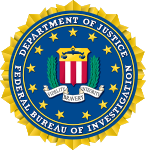- National Security Branch
-
Federal Bureau of Investigation Common name Federal Bureau of Investigation Abbreviation FBI Seal of the Federal Bureau of Investigation agency information Motto Fidelity, Bravery, Integrity Agency overview Formed July 26, 1908 Employees 35,437[1] (May 31, 2011) Annual budget 7.9 billion USD (2010)[1] Legal personality Governmental: Government agency Jurisdictional structure Federal agency
(Operations jurisdiction)United States Legal jurisdiction As per operations jurisdiction. Governing body United States Congress Constituting instrument United States Code Title 28 Part II Chapter 33 General nature - Federal law enforcement
- Civilian agency
Operational structure Headquarters J. Edgar Hoover Building, Washington, D.C. Sworn members 13,963 (May 31, 2011)[1] Unsworn members 21,474 (May 31, 2011)[1] Agency executives - Robert S. Mueller III, Director
- Timothy P. Murphy, Deputy Director
- List of FBI Directors, Other directors
Child agencies Major units 5- Behavioral Analysis Unit (BAU)
- Law Enforcement Bulletin Unit (LEBU)
- Hostage Rescue Team (FBI) (HRT)
- Joint Terrorism Task Force (JTTF)
- FBI Police
- National Security Branch (NSB)
Field offices 56 (List of FBI Field Offices) Notables People - John Edgar Hoover, Director, for being the founding director
- William Mark Felt, former Federal Agent, for whistle blowing, Watergate scandal
- Joseph Leo Gormley, Forensic Scientist, for expert testimony
Significant Operations Website fbi.gov
this information Seal of the National Security Branch
Seal of the National Security Branch
The National Security Branch (NSB) is the sub-service within the U.S. Federal Bureau of Investigation that is responsible for counterterrorism, counterintelligence and intelligence. Headed by an Executive Assistant Director of the FBI, the NSB is responsible to the Director of National Intelligence, the FBI Director and the U.S. Attorney General. The NSB was formed by the unification of the FBI's FBI Counterterrorism Division, the Directorate of Intelligence and the Weapons of Mass Destruction Directorate.
It is speculated that this will lead to the formation of "career paths" for FBI Special Agents; meaning that once a new agent has completed Special Agent Training at FBI Academy in Quantico, Virginia, and has completed the mandatory probationary period, that he or she will choose to go into the National Security Branch, or go into the "Criminal" part of the Bureau and focus on crimes such as organized crime, narcotics, civil rights violations, fraud, and violent crime. Some advocates of this new program say that this re-organization will help the fight against terrorism by making it less bureaucratic.
References
- ^ a b c d "Quick Facts". Federal Bureau of Investigation. http://www.fbi.gov/quickfacts.htm. Retrieved 2009-11-20.
External links
Categories:- Federal Bureau of Investigation
- United States intelligence agencies
- United States government stubs
- Crime stubs
Wikimedia Foundation. 2010.

